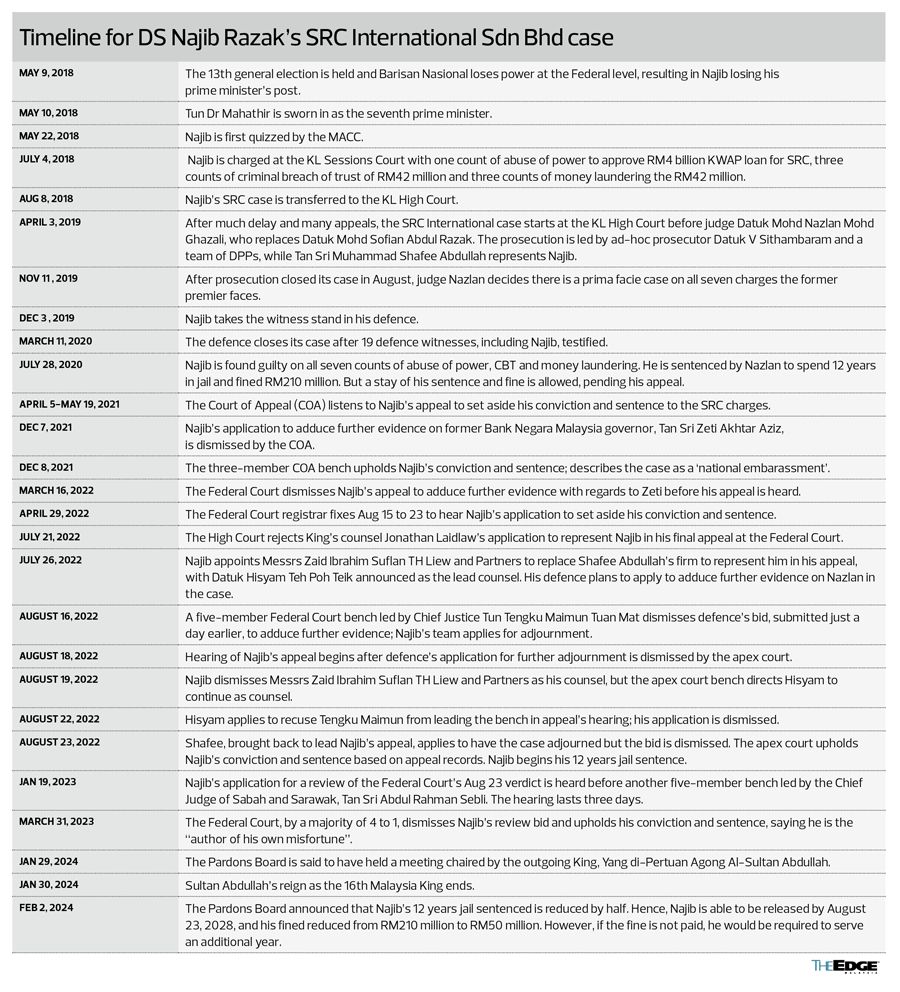
Photo by Zahid Izzani/The Edge
KUALA LUMPUR (Jan 7): Royal addendum? House arrest? If you, like many Malaysians, are confused over what took place in imprisoned former prime minister Datuk Seri Najib Razak's court case on Monday, below is a brief elucidation highlighting the main takeaways.
It is important to bear in mind that the matter is far from over and has to be adjudicated in the court of law, as the Court of Appeal on Monday decided to send the matter back to the High Court for the merits of the former Umno president’s application to be heard.
What is this case about?
Najib wants the court to order the government to produce an addendum that he claims was issued as part of the pardon granted to him by the then-Yang di-Pertuan Agong (YDPA), Al-Sultan Abdullah Ri'ayatuddin Al-Mustafa Billah Shah, in February last year. The purported addendum is claimed to allow Najib to serve the remainder of his prison sentence under house arrest.
In addition to presenting the purported addendum in court, Najib wants the court to order the government to enforce the purported decree.
The High Court had dismissed the ex-PM's application on July 3 last year, on the grounds that his bid was based on hearsay evidence, which is generally not accepted by the court.
Najib appealed and the appellate court reversed this decision, sending the matter back to the High Court for it to hear the substantial arguments on the matter.
What is the addendum?
In July 2020, Najib was convicted of all seven counts of abuse of power, money laundering, and criminal breach of trust in the RM42 million SRC International Sdn Bhd criminal case. He was sentenced to 12 years’ imprisonment and a RM210 million fine.
In August 2022, after exhausting all avenues of appeal against his conviction, Najib was sent to Kajang Prison, where he is currently serving his sentence.
In February 2024, the Federal Territories Pardons Board halved Najib's jail term to six years, and his fine was reduced by 76% to RM50 million. This is considered the main order.
The Pardons Board decided this on Jan 29, 2024. However, there was purportedly an additional addendum from the then-YDPA, addressed to the then-attorney general, Datuk (now Tan Sri) Ahmad Terrirudin Mohd Salleh, stating that Najib can serve the remainder of his sentence under house arrest.
However, this purported addendum, as argued by senior federal counsel Shamsul Bolhassan for the government, was not submitted before the board. In addition, the 16th YDPA’s personal copy, which Najib’s son Datuk Nizar Najib claims was given to him, is unsealed and unsigned.
Whether or not such an addendum exists seems answered on Monday, when Nizar produced a letter allegedly from the comptroller of the Pahang palace. But the question of its legitimacy remains, which a court of law may decide on when the merits are heard at the High Court.
Court of Appeal judge Datuk Seri Mohd Firuz Jaffril in his majority decision on Monday said the court was not concerned about the authenticity of the addendum. Rather, it is whether the addendum concerned exists or otherwise.
Najib's lead counsel Tan Sri Muhammad Shafee Abdullah has said that while the Agong can consult and listen to the advice of others, the sole discretionary power to grant the pardon rests with the Agong. Shafee further said that the addendum was in addition to the main order to halve the sentence, and seems a logical step for the former PM to serve the remaining sentence under house arrest.
The government lawyers disagree and maintain the main order is considered the legitimate order.
Does this mean Najib will serve his jail sentence under house arrest?
No. The matter still has to be argued in the courts and for parties to present all their arguments. The ex-PM will not automatically be allowed to serve his sentence under house arrest. Even if the High Court decides in Najib’s favour, the government could still appeal to the Court of Appeal or Federal Court.
At the same time, the government also can file or seek leave to appeal to the Federal Court, if it so desires, against Monday’s decision. This must be done or filed within 30 days from Monday.
The case will be called up on Jan 13 for case management at the High Court before a different judge. There may not be any significant developments soon as parties will have to file their arguments and other additional evidence before the matter is heard in court.
*It should be noted that the law does not currently allow for prison sentences to be served at home. However, Parliament is expected to table an amendment to allow it sometime this year.

